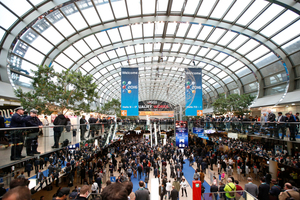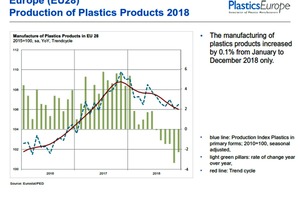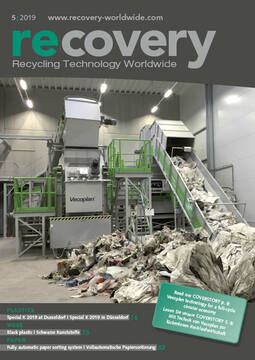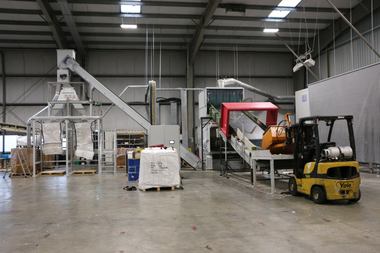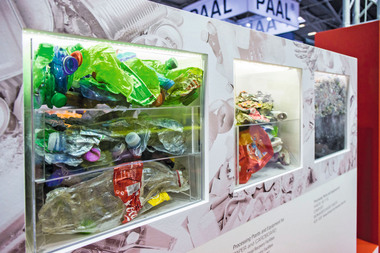The European plastics industry: hoping for the best, preparing for the worst
Sales of the plastics processing industry in Germany did actually rise by over 3 % last year, roughly twice as fast as GDP, notes Oliver Möllenstädt, Executive Director of GKV, the German Association of Plastics Converters (GKV). “This is remarkable as the economy moves in an increasingly uncertain international environment,” he says. But solid growth across much of the industry “must not hide the fact that the plastics industry faces major challenges. The debate about plastics in the environment, which is sometimes very emotional in the media and the public, has massive impact on plastics processing companies.” Möllenstädt says the GKV‘s annual company survey showed the vast majority of companies were affected. “In our view, the course of political and public debate so far is going in the wrong direction,” he says. “The European Commission and national governments are attempting to address consumer concerns with symbolic gestures such as restrictions on single-use plastics (SUPs) and carrier bags. This strategy may quiet the public debate in the short term and give the impression of high activity, but it is not effective in the interest of the environment and sustainability.”
The plastics industry in Europe “is facing a reckoning,” says Martin Wiesweg, director of chemicals (PS, EPS and PET) at IHS Markit. “The sector has experienced years of moderate, yet steady growth, robust earnings and stellar contributions in terms of product and process innovation, employment generation, and added value in terms of functionality, convenience, and aesthetics for people’s lives. However, increasingly, it is losing social compact and public goodwill. “At the heart of this discord is the huge problem of plastic waste. With increasing intensity and rapidity, consumers and authorities in Europe are uniting against plastics by bringing sweeping measures to curb its use and strictly implement a waste hierarchy,” says Wiesweg. “The fact that the authorities are willing to risk significant cost and inconvenience to consumers is a testament of how much public faith has eroded relative to plastics.”
Directive will curb Single-Use Plastics
The European Parliament approved the Single-Use Plastics Directive in March. It is likely to be implemented across member states by 2021. The rules address the ten most found items on EU beaches. Measures include a ban on selected single-use plastics products for which alternatives exist on the market – cotton bud sticks, cutlery, plates, straws, and stirrers, as well as cups, food and beverage containers made of expanded polystyrene and on all products made of oxo-degradable plastic – plus sticks for balloons. Also included in the Directive is a 90 % separate collection target for plastic bottles by 2029 (77 % by 2025) and the introduction of design requirements to connect caps to bottles, as well as a target to incorporate 25 % of recycled plastic in PET bottles as from 2025 and 30 % in all plastic bottles as from 2030.
PlasticsEurope, the trade association for plastics material producers in Europe, said it welcomed the adoption of the Directive, and the acknowledgement “that the fight against litter is a shared responsibility between competent authorities, producers and consumers.” It called for prompt setting-up of guidelines on definitions and categories to avoid the risk that different interpretations will prevail among Member States. The Directive comes in the wake of the “European Strategy for Plastics in a Circular Economy” published by the European Commission at the beginning of 2018. This contains plans to curb waste, stop littering at sea, and to make plastics recycling more profitable for business in the European Union. All plastics packaging on the EU market will need to be recyclable by 2030.
At EuPC, the Brussels-based trade association representing European plastics converters, Managing Director Alexandre Dangis decries recent legislative moves to curb plastics. “Way too often are the benefits of plastics ignored,” he says. “They help fighting climate change by enabling the saving of CO2 emissions in all aspects of our lives – preventing food waste, light-weighting, insulation, and more. The plastics industry is committed and working hard to increase its circularity.” Numerous associations and companies have pledged to increase the recycling of plastics waste and the use of recycled polymers, he points out.
To monitor and register the industry’s efforts to reach the EU target of 10 million tonnes recycled polymers used annually between 2025 and 2030, EuPC has just created the online monitoring platform MORE (MOnitoring Recyclates for Europe). “MORE will become the single, unified online tool to monitor the uptake of recycled polymers into products by plastics converters in Europe,” says Dangis. “It will allow the industry to demonstrate its efforts and report consolidated numbers on the use of recyclates in the entire EU.” Quality of recyclates will have to be improved if the ambitious EU targets are to be reached. Studies carried out by EuPC in 2017 and 2018 show that plastics converters currently have trouble finding an adequate supply of recycled polymers.
Almost three years ago – during K 2016 in fact – EuPC, PlasticsEurope and Plastics Recyclers Europe launched the Polyolefin Circular Economy Platform (PCEP). Secretary General Venetia Spencer describes it as a forum for collaboration and action, bringing together everyone active in polyolefins to transform our industry and advance the circular economy. “Our membership is open to the entire value chain, producers, converters, recyclers, brand owners, retailers, waste management companies and all the remaining actors who interact at any stage of the material cycle,” she says. PCEP has pledged to increase by one million tonnes the volume of recycled polyolefin content used in product in Europe. This is the largest polymer pledge made as part of the European Union’s Plastic Pledge campaign, which aims to see 10 million tonnes of recycled content in products in Europe in 2025 through voluntary industry action. “We are also committed to reusing or recycling 60 % of collected polyolefin packaging by 2030 and having more than 75 % of polyolefin packaging designed for recycling,” Spencer says.
“Effecting a transformation from today’s linear system to a regenerative one will be a challenging and complex task, requiring innovation and collaboration among industry partners,” says polyolefins producer Borealis, with most of its manufacturing in Europe, noting that it is providing various solutions for the new circular economy. Borealis has been taking the bull by the horns by moving more into mechanical recycling in recent years. In 2016, for example, it acquired two of Europe’s largest operators in the sector, which are now known as mtm plastics. Last year, these acquisitions were augmented by the acquisition of another leading recycler, Ecoplast. Related activities include the Full PE Laminate concept, an easily recyclable mono-material for polyethylene-based flexible packaging.
Chemical recycling on the rise
The growing importance of chemical recycling was also reflected in the creation this January of a new association, Chemical Recycling Europe, to promote and implement new and innovative solutions. “The fast development of chemical recycling technologies that can provide a solution to recycle hard-to-recycle plastic waste is outpacing the regulation and policy around it,” CRE claims.
In December, one major materials supplier, SABIC, signed a memorandum of understanding (MoU) with UK-based Plastic Energy, a pioneer in chemical plastics recycling, for the supply of feedstock tosupport SABIC’s petrochemical operations in Europe. The two companies intend to build a commercial plant in the Netherlands to refine and upgrade a feedstock patented by Plastic Energy called Tacoil, which will be produced from the recycling of low quality, mixed plastic waste otherwise destined for incineration or landfill. The plant should enter commercial production in 2021.
Another polymer major looking to boost chemical recycling is BASF. “With BASF’s new ChemCycling project, we want to make a significant contribution in reusing plastic waste as feedstock in production,” says one company representative. “Together with our customers and partners, we developed and manufactured the first pilot products based on chemically recycled plastic waste.” BASF is also a supporter of the PolyStyreneLoop project, which is at the pilot plant stage with a solvent-based recycling technology that should allow the recycling of expanded polystyrene (EPS) used in building insulation. Unlike existing mechanical recycling approaches, the technology would also be suited to deal with flame retardants that have been used in the past, but which are now banned.
Bioplastics growing
How much will bioplastics contribute to the circular economy? Europe is proving to be an important centre for production of these materials. Latest market data compiled by European Bioplastics (in cooperation with the Nova-Institute) shows around 20 % of global bioplastics production capacity, which hit 2.11 million tonnes in 2018, is located in Europe. That figure should to grow to 27 % by 2023, supported by recently adopted policies in several European Member States, notably Italy and France.
Not surprisingly, EUBP says it fully supports the transition from a linear to a ‘no-leakage’ circular and bio-based economy in Europe. “However, specific regulations like the single-use directive fail to acknowledge the potential of biodegradable certified compostable plastics in those situations where EU legislation for hygiene and food contact need to be fulfilled, but where no multi-use options can be deployed,” it says. “Especially since boosting organic recycling is a major pillar of the EU´s circular economy.”
The Brexit effect
Will the UK ever leave the European Union? At the time of writing, the answer appeared to be yes, but questions remain over the exact when and how. Under the original plan, the UK would in fact have already left (on March 29, 2019), but the UK parliament has succeeded only in deciding what sort of a “divorce settlement” from the EU it does not want. The uncertainty has been driving many people to distraction. The latest deadline is October 31.
Nobody knows what the consequences for the plastics industry will be. But many companies with manufacturing in, and/or trading with, the UK are planning for the worst, while hoping for the best. Things they are looking at include a possible need for increased warehousing, risk of border delays, new customs systems and processing codes. This also incorporates obligations to comply with any new UK legislation – a UK equivalent to EU REACH regulations for example.
Despite all this, Philip Law, Director-General of the British Plastics Federation trade association, said in April that he was “very upbeat” about the long- term prospects for the plastics industry in the UK. “There’s always adversity of some kind in business but our essential skill is to look for ways to find opportunities in the resolution of problems,” he said. The Brexit saga for many helped fill the gap in television viewing left by Game of Thrones, with numerous key players falling on their swords. Law said that Brexit was threatening to turn into a “national Calvary.” “UK business, sensibly, has become more cautious, avoiding bold moves, but there are many other factors causing uncertainty for the plastics industry globally – the China-USA trade tensions, the slowdowns in China and Germany and the travails of the aerospace industry,” he said. But he put a very positive spin on things. “For the UK we have to look at the fundamentals, which will continue to propel the plastics industry achievement to new heights in the decades to come. We have a strong platform in raw material manufacture and distribution (…) and we have a vibrant recycling industry. All the elements of a circular economy are in place.”
According to Kühmann, Managing Director Plastics and Rubber Machinery VDMA, European manufacturers of plastic and rubber machinery have been delighted by the excellent progress which has ensured that industry-wide turnover has almost doubled over the past ten years. The turning point has now been reached, and the VDMA now predicts a drop in turnover of 10 % for German manufacturers of plastic and rubber machinery, calculated for 2019. The reason for this is the cyclical downturn, which is long overdue after 10 years of growth. This downturn is, however, augmented by the uncertainty that is currently prevailing in the automotive industry. Investments are experiencing a standstill, to some extent, for this reason. The use of plastics is also subject to increasing scrutiny in the packaging sector. Here, the poor image that plastics have been tarnished with today is blanketing the sector”, explains Kühmann and continues: “In addition, the trade conflict between the USA and China has led to worldwide delays in the supply chain and is having a noticeable impact on the market, introducing more insecurity. In Europe, there are also uncertainties due to Brexit, with the methods via which the UK will leave the EU remaining unclear, and the immense Italian national debt.”
Machinery makers see market “moving sideways”
Among major European machinery makers, injection moulding specialist Engel says sales in its fiscal year 2018/19 grew by around 6 % – which it calls moderate. But now things are going sideways. “In Europe, the German speaking countries of Germany, Austria and Switzerland in particular remain as before at a good level. On the one hand, since the last quarter of 2018, we have been feeling a significant decline in production in the German automotive industry. The effects of Brexit, punitive tariffs and sanctions, as well as the debate about diesel limits and driving bans are unclear.” The company points out that increasingly lower limits on emissions from vehicles will favour the use of plastics, which are the ideal materials for weight saving. For a long time, the EU has been clamping down on emissions of nitrogen oxides, hydrocarbons, particulates, and carbon monoxide, and more recently has been regulating CO2 emissions as well. A target for passenger vehicles of 130 g/km was phased in between 2012 and 2015, and a new target of 95 g/km will apply from 2021.
The circular economy is proving to be a strong driver of innovation among machine makers as well as materials companies. “As the quality of the recycled material is usually more volatile than the quality of virgin material, recycled material has so far been out of the question for many applications,” it notes. “Intelligent assistant systems, which are an essential feature of Industry 4.0, are about to change this.” At K 2019, Engel will premiere the use of its iQ weight control smart software – which monitors the injection moulding process shot by shot, and automatically compensates for fluctuations in real time – using recycled material.
⇥Stand: Hall 7 / SC09
⇥Stand: Hall 7 / SC09

